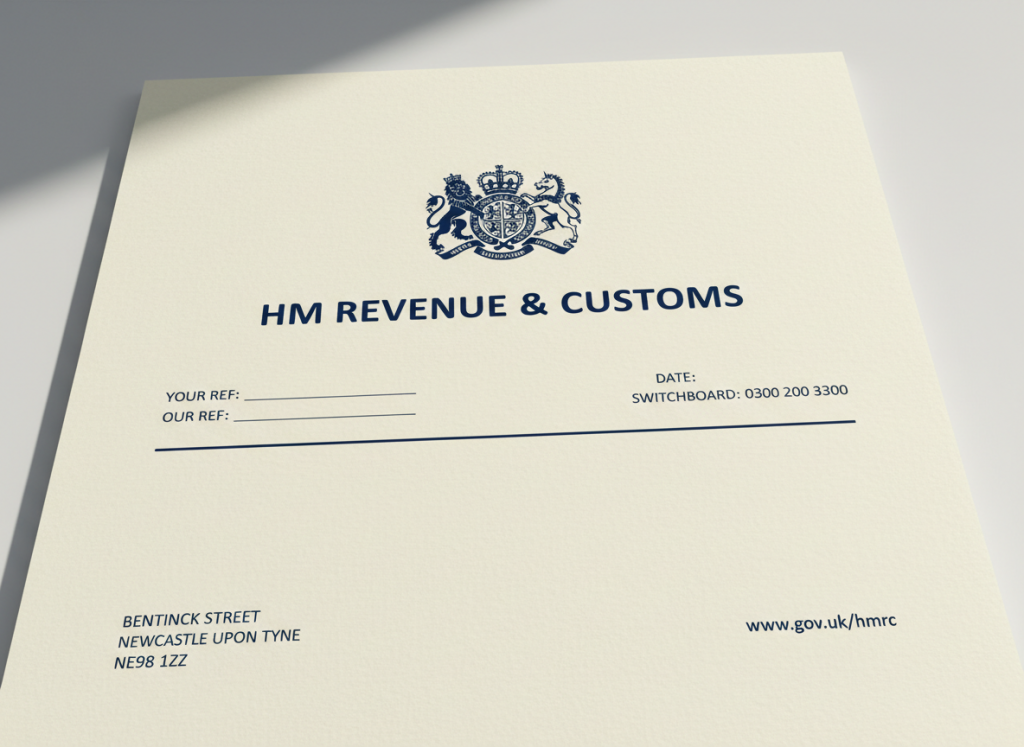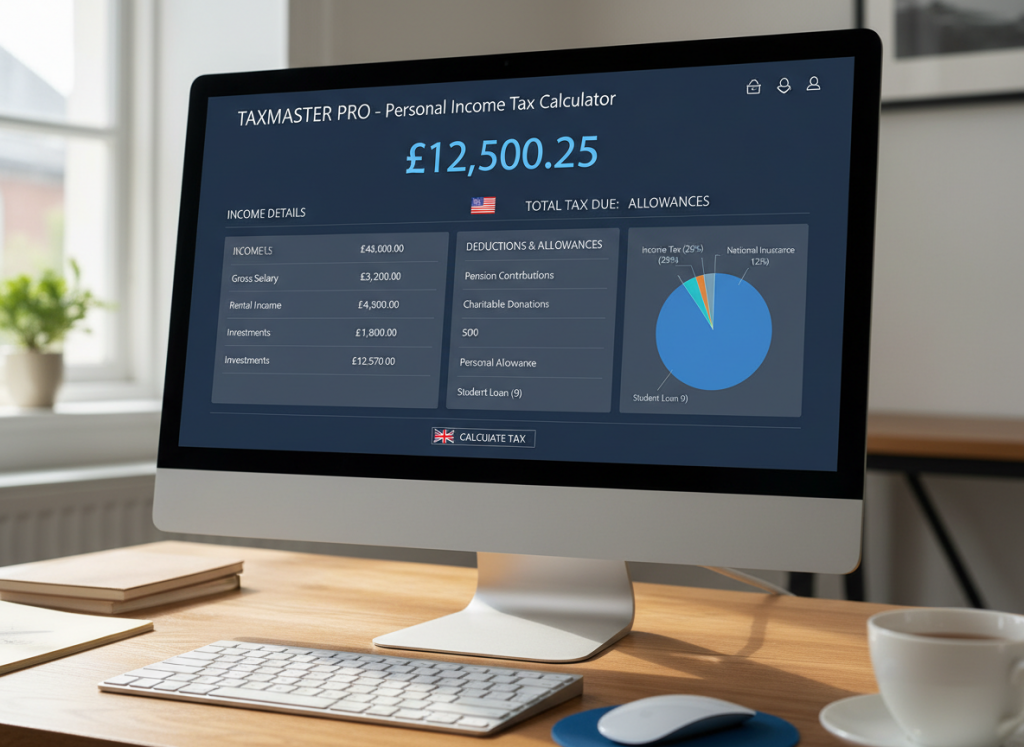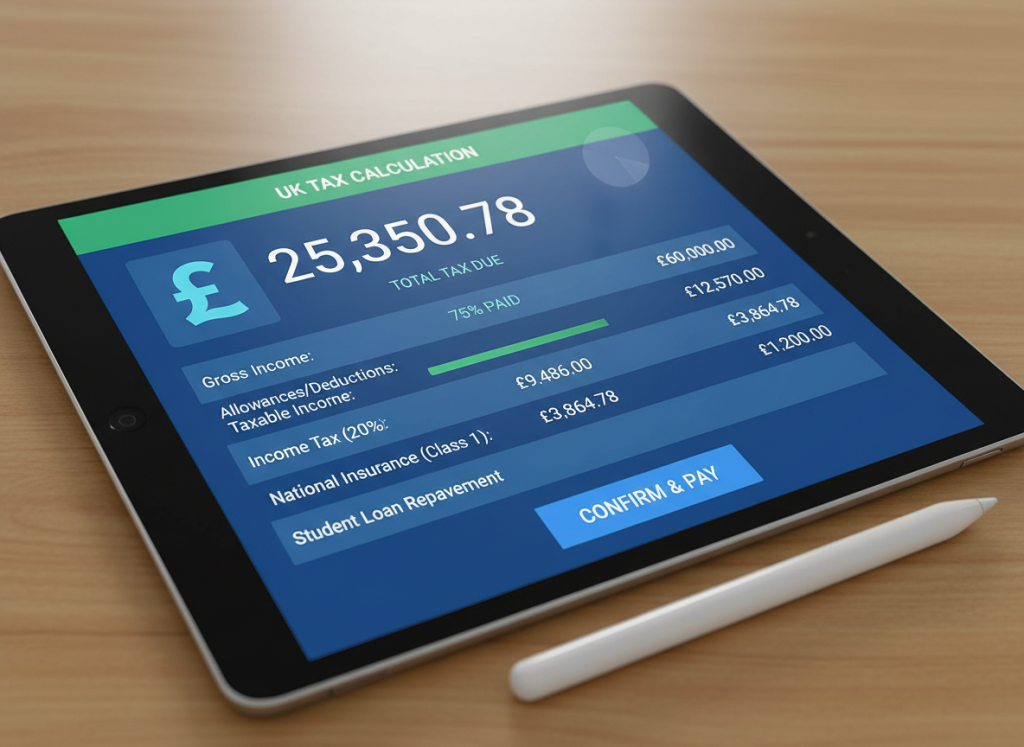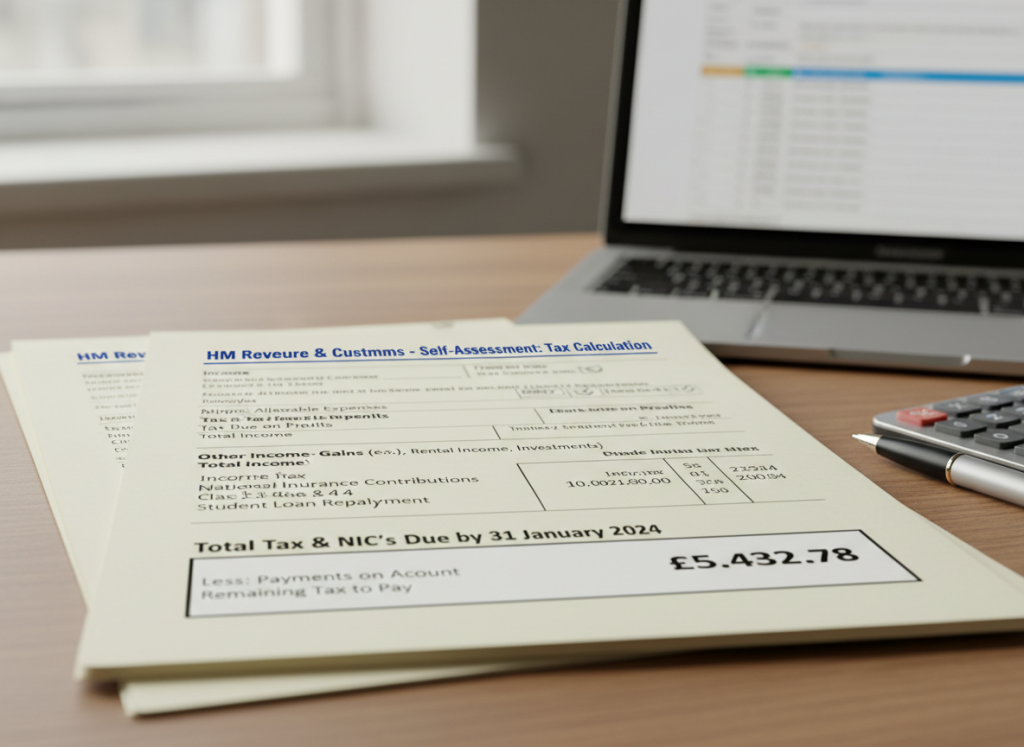
A taxpayer is liable for tax on self-employment income if they meet any of the following, based solely on self-employment receipts (total income before expenses, including turnover, other business income, balancing charges, and goods/services for own use):
- Total receipts exceed £1,000: Receipts up to £1,000 are exempt via the trading income allowance and do not require reporting, unless from a connected party (e.g., family or related business). If over £1,000, you must file a return and either claim the £1,000 allowance (no expenses or other allowances deductible) or deduct allowable expenses/capital allowances to calculate taxable profits. You cannot claim the allowance to create a loss. The allowance can be split across multiple self-employments but caps at £1,000 total.
- Voluntary filing even if under £1,000: You must file if you want to voluntarily pay Class 2 National Insurance contributions (NICs) to maintain entitlement to benefits like State Pension, preserve your self-employment record (e.g., for Maternity Allowance), claim Tax Free Childcare based on self-employment income, or reclaim CIS deductions as a subcontractor.
- No need to file if under thresholds and no voluntary reasons: If total receipts ≤£1,000 (not from connected parties) and no voluntary NICs or other claims, check if a return is needed via www.gov.uk/check-if-you-need-a-tax-return. If not, notify HMRC by 31 January 2026 to avoid penalties.
- Registration requirement: If you started self-employment between 6 April 2024 and 5 April 2025 and have not registered, do so immediately via www.gov.uk/register-for-self-assessment/self-employed. If you ceased before 6 April 2025, notify via www.gov.uk/stop-being-self-employed to correct NICs and avoid overpaying tax.
- Special cases triggering liability:
- Foster/Shared Lives carers: If qualifying care receipts exceed your qualifying amount (calculated via Helpsheet 236), you are liable; use simplified method or full calculation.
- Rent-a-Room scheme: If gross receipts from furnished accommodation in your home ≤£7,500 (£3,750 if shared), no liability and no need to complete most boxes; if over, liable unless using the scheme (which caps relief at £7,500/£3,750, no expenses/capital allowances/trading allowance claimable).
- Managing Serious Defaulters (MSD) programme: If in this during the year, liable and must use full pages.
- Overseas business: If all business abroad and using remittance basis, limited boxes apply; if any UK business, full arising basis applies.
If none apply and you believe no return is needed, confirm via the checker tool.
Impact of Different Income Thresholds
Thresholds directly affect form choice, allowances, and tax rates (self-employment profits treated as non-savings income in tax calculation):
- £1,000 (Trading Income Allowance): Exempt if ≤ this; over requires filing. Impacts: Cannot deduct expenses if claimed; no loss creation. For tax calculation, reduces taxable non-savings income.
- £90,000 (Turnover Threshold for Short vs. Full Pages): If turnover <£90,000 (or would be if full year), use short pages. If ≥£90,000, or if accounting period not 12 months/ending in tax year, basis change with adjustment income, need to adjust Class 4 NICs profits, or in MSD, use full pages. Impacts: Full pages required for complex adjustments; short for simpler cases.
- Tax Bands for Self-Employment Profits (Non-Savings Income): After deductions/allowances, profits are taxed in UK bands (assuming non-Scottish resident; Scottish rates differ but model assumes UK as PDFs focus on general):
- First £37,700: 20% (basic rate).
- Next £87,440: 40% (higher rate).
- Over £125,140: 45% (additional rate).
- Personal Allowance (£12,570 standard) reduces taxable income but tapers if adjusted net income >£100,000 (see Section 13 of tax calculation). No savings/dividend allowances apply as only self-employment considered.
- If profits create losses, carry forward or set against other income (but model limits to self-employment only).
- NICs Thresholds: Class 2 voluntary if profits <£6,725; mandatory if ≥£6,725 (flat rate). Class 4: 9% on profits £12,570-£50,270; 2% over £50,270. Impacts filing if voluntary.
- Other Thresholds: £7,500 Rent-a-Room (as above). For tax calculation, if income >£100,000, Personal Allowance reduces by £1 for every £2 over (zero at £125,140). High Income Child Benefit Charge if >£50,000, but not applicable here as only self-employment.
Use cash basis (money in/out) unless opting for traditional accounting (accruals). If changing basis, transitional adjustment may apply.
Information to Put in Every Box (Self-Employment Pages)
Determine form: Use SA103S (Short) if turnover <£90,000 and no complex adjustments; SA103F (Full) otherwise. Print from gov.uk and enter name/UTR (10-digit number from HMRC letters) at top if not pre-printed. For tax calculation (SA110), enter self-employment profits as non-savings income in Section 1.
SA103S (Short Pages) Boxes
- Box 1 (Description of business): Enter business type (e.g., “Plumber”, “Qualifying carer” for foster carers, “Rent-a-Room” if using scheme).
- Box 4 (If you are a foster carer or shared lives carer): Put ‘X’ if applicable; if qualifying amount > receipts, put ‘0’ in Box 31 and stop; otherwise proceed.
- Box 5 (If your business started after 5 April 2024, enter the start date): Enter DD MM YYYY (e.g., 15 05 2024).
- Box 6 (If your business ceased before 6 April 2025, enter the final date of trading): Enter DD MM YYYY (not end-of-year date).
- Box 7 (Date your books or accounts are made up to): Enter usual annual date (DD MM YYYY, e.g., 05 04 2025); must be after 31 March 2024 and before 6 April 2025, else use full pages.
- Box 8 (Traditional accounting): Put ‘X’ if using accruals basis (not cash basis).
- Box 9 (Your turnover): Enter total income received/earned before expenses (include cash/card/cheques, tips/commissions, payments in kind, money owed if traditional accounting, full CIS amounts if subcontractor). For Rent-a-Room over limit: gross receipts including services.
- Box 10 (Any other business income): Enter trading income not in turnover (e.g., subletting business space, non-arm’s length reverse premiums, third-party trading income).
- Box 10.1 (Trading income allowance): Enter up to £1,000 if claiming (against total receipts); cannot exceed receipts or create loss. Leave blank if deducting expenses instead.
- Boxes 21, 28, 31 (For specific claims, e.g., Tax Free Childcare or simplified foster care): Enter as directed (e.g., Box 21: expenses if not claiming allowance; Box 28: capital allowances; Box 31: taxable profit/loss).
- Box 36 (Voluntary Class 2 NICs): Put ‘X’ if paying voluntarily for benefits.
- Box 38 (CIS deductions reclaim): Enter amount to reclaim if subcontractor.
For low-turnover cases (e.g., expect >£1,000 next year or voluntary NICs): Complete only Boxes 1-8 (and ‘X’ in 36 if applicable). For Rent-a-Room under limit: Only Box 1. Provisional: Only Boxes 1,5,9,10,21/22,28,31/32.
SA103F (Full Pages) Boxes
- Box 1 (Business name): Enter full business name (unless your own name).
- Box 2 (Description of business): Enter business type (e.g., “Qualifying carer” for foster carers, “Rent-a-Room” if using scheme).
- Box 6 (If your business started after 5 April 2024): Enter DD MM YYYY.
- Box 7 (If your business ceased after 5 April 2024 but before 6 April 2025): Enter DD MM YYYY (not end-of-year).
- Box 8 (Date your books or accounts start – the beginning of your accounting period): Enter DD MM YYYY (usually day after prior period end; or start date if new).
- Box 9 (Date your books or accounts are made up to or the end of your accounting period): Enter DD MM YYYY (usual annual date; or cease/start date if applicable).
- Box 10 (Traditional accounting): Put ‘X’ if using accruals (not cash basis).
- Box 13 (Foster carer flag): Put ‘X’ if qualifying carer; if amount > receipts, put ‘0’ in Box 76 and stop.
- Box 14 (Other details, if applicable): Enter if MSD or similar.
- Box 15 (Total receipts/turnover): Enter total income before expenses (similar to short Box 9; for foster carers: total receipts).
- Box 16 (Other business income): Enter as short Box 10.
- Box 16.1 (Trading income allowance): Enter up to £1,000 if claiming.
- Box 30 (Rent-a-Room relief if over limit): Enter £7,500 (£3,750 if shared).
- Box 31 (Qualifying amount for foster carers): Enter if using simplified method.
- Box 47/48, 64/65 (Profit/loss): Enter net after expenses/allowances.
- Box 59 (Balancing charges): Enter if applicable (e.g., Rent-a-Room).
- Box 60 (Goods and services for own use): Enter value.
- Box 68 (Adjustments, e.g., for basis period): Enter if period not standard.
- Box 73 (Taxable profit): Enter final.
- Box 76 (Taxable profit or loss): Enter ‘0’ if no profit; for overseas: limited.
- Box 101 (Class 4 NICs adjustments): Enter if needed.
For multiple accounts: Repeat for each, consolidate recent. Provisional: Only Boxes 1-16, 47/48, 64/65, 73, 76/77 (plus 73.3/73.4/74 if applicable). For Rent-a-Room under limit: Only Boxes 1-2; over: Boxes 1-10,15,30,59.
Tax Calculation Summary (SA110) Working Sheet
Enter self-employment taxable profits (from short Box 31 or full Box 76) as non-savings income in Section 1. Complete sections sequentially:
- Section 1: Add profits here (non-savings/lump sums).
- Section 4: Deduct allowances (e.g., Personal Allowance via Section 13 if >£100,000 income).
- Section 5: Taxable income = profits minus allowances.
- Section 6: Allocate to bands (e.g., first £37,700 at 20%).
- Section 7: Calculate tax due.
- Section 15: Add Class 2/4 NICs (thresholds as above).
- Other sections: Skip if no savings/dividends/gains/etc.
If transition profits from 2023-24 basis reform: Calculate twice (with/without in Section 1) for separate charge.
Checklist of Documents, Evidences, Receipts, Invoices, and Forms Needed to Submit a Tax Return Correctly
Do not submit any documents with your return unless HMRC asks; keep for records (at least 22 months after tax year end, or longer if enquiry). Checklist for preparation/submission:
- Records of income/expenses: Receipts/invoices for all turnover (e.g., sales invoices, bank statements for cash/card payments), other income, balancing charges, goods for own use.
- Expense evidences: Invoices/receipts for allowable expenses (e.g., costs deducted if not claiming trading allowance).
- Accounts/books: Prepared accounts (cash or traditional basis) showing profit/loss calculation; if provisional, note reasons.
- CIS statements: If subcontractor, forms showing deductions to reclaim.
- Helpsheets: HS236 (foster carers), HS222 (profits calculation), HS223/HS229 (Rent-a-Room/other).
- UTR confirmation: Letters/emails from HMRC with your 10-digit UTR.
- Registration proof: If new, confirmation from www.gov.uk/register-for-self-assessment.
- NICs evidence: If voluntary Class 2, records supporting benefit entitlement (e.g., State Pension gaps).
- Forms to submit: Completed SA100 (main return) + SA103S or SA103F + SA110 (if calculating yourself). No attachments required for submission.




